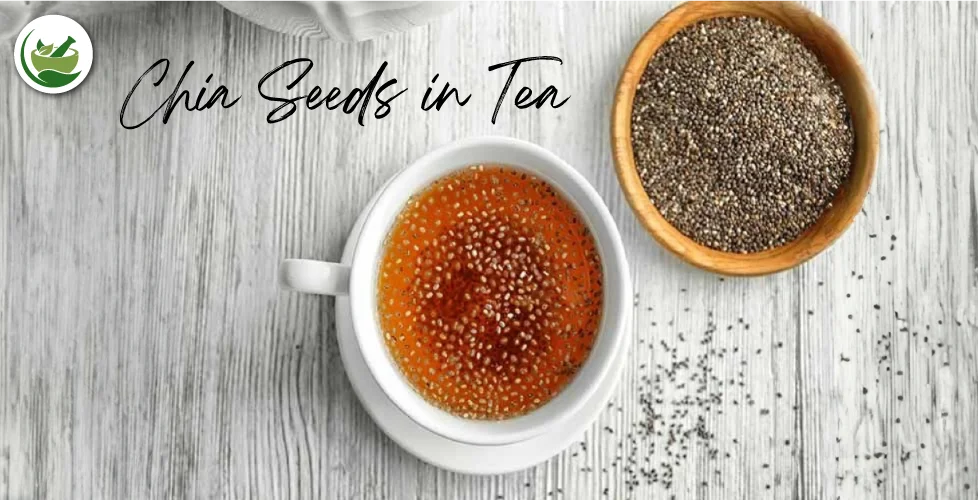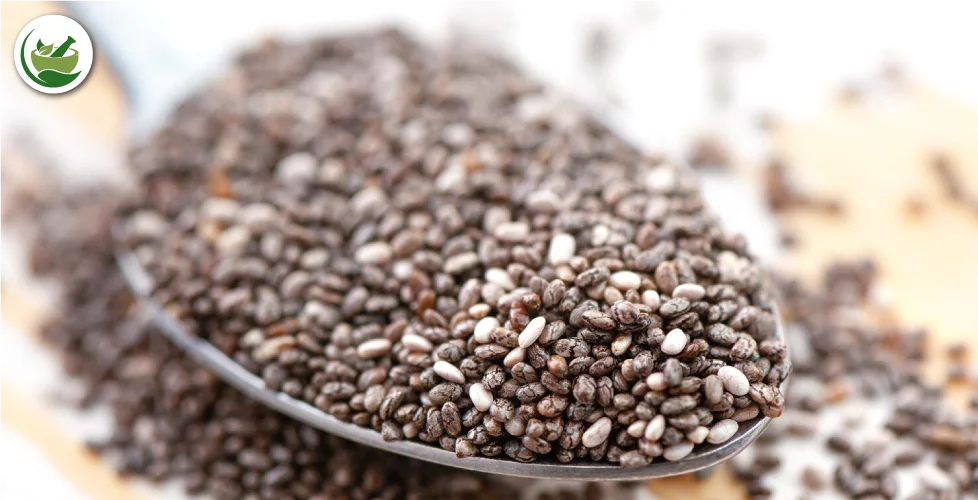
The trend of incorporating chia seeds into tea has captured the attention of health enthusiasts worldwide, blending the hydrating benefits of tea with the nutritional powerhouse that is chia seeds. This synergy not only elevates your tea experience but also boosts its health benefits, making each sip a step closer to optimal wellness.
In this guide, we’ll explore the myriad health benefits, potential effects, and practical ways to incorporate chia seeds into your tea, ensuring you reap the maximum benefits from this nutritious combination.
Nutritional Profile of Chia Seeds
Chia seeds, derived from the Salvia hispanica plant, are small but immense in nutritional value. An ounce of chia seeds packs a punch with:
- Dietary Fiber: Essential for digestive health, an ounce contains 11 grams, almost half the daily recommended intake.
- Protein: With 4 grams per ounce, they’re a plant-based protein source vital for muscle repair and growth.
- Omega-3 Fatty Acids: These seeds are one of the richest plant-based sources of ALA (alpha-linolenic acid), crucial for heart health.
- Minerals: Rich in calcium, magnesium, and phosphorus, chia seeds support bone health, while manganese aids metabolism.
- Antioxidants: They’re also loaded with antioxidants that combat free radicals, reducing oxidative stress and inflammation.
| Nutrient | Amount per Serving |
| Calories | 139 kcal |
| Protein | 4 g |
| Total Fat | 9 g |
| Omega-3 Fatty Acids | 5 g |
| Carbohydrates | 12 g |
| Fiber | 11 g |
| Calcium | 18% of the RDA |
| Manganese | 30% of the RDA |
| Magnesium | 30% of the RDA |
| Phosphorus | 27% of the RDA |
| Zinc | 7% of the RDA |
| Vitamin B3 (Niacin) | 16% of the RDA |
| Potassium | 1% of the RDA |
| Vitamin B1 (Thiamine) | 15% of the RDA |
| Vitamin B2 (Riboflavin) | 4% of the RDA |
Health Benefits of Chia Seeds in Tea

Enhanced Hydration and Satiety
Adding chia seeds to tea significantly enhances hydration levels, with seeds able to absorb 10–12 times their weight in water. This increased water content can help maintain hydration throughout the day. Moreover, the gel-like consistency of soaked chia seeds can prolong feelings of fullness, aiding in weight management by reducing overall calorie intake.
Related blog Benefits Of Lemon Water With Chia Seeds
Improved Heart Health
The omega-3 fatty acids in chia seeds are known for their cardiovascular benefits. They can help reduce high blood pressure and bad cholesterol levels, lowering the risk of heart disease. When combined with the antioxidant-rich properties of certain teas, this blend can be a potent heart health elixir.
Blood sugar regulation
The high fiber content in chia seeds plays a crucial role in regulating blood sugar levels by slowing down the absorption of sugar into the bloodstream. This makes chia seed-infused tea an excellent beverage choice for those managing diabetes or seeking to stabilize energy levels and mood throughout the day.
Boosted Digestive Health
Fiber is also key to digestive health, promoting regular bowel movements and preventing constipation. The soluble fiber in chia seeds can act as a prebiotic, feeding the good bacteria in the gut and supporting overall gut health.
Bone Strength and Development
Chia seeds are a significant source of calcium, magnesium, and phosphorus, minerals essential for bone health and density. Regular consumption can help combat osteoporosis and maintain skeletal strength, making it particularly beneficial for individuals with dairy intolerances or those looking for plant-based calcium sources.
How to Incorporate Chia Seeds into Your Tea

Incorporating chia seeds into your tea routine is straightforward and adaptable to your preferences. Here’s how to do it:
- Pre-soak Chia Seeds: Start by soaking 1 tablespoon of chia seeds in 3 tablespoons of water for about 30 minutes. This allows them to swell up and form a gel-like consistency, making them easier to digest and enhancing their nutritional benefits.
- Prepare your tea: Brew your favorite tea as usual, whether it’s green, black, herbal, or fruit tea. Allow it to reach your desired temperature and strength.
- Mix in the chia gel. Once your tea is ready and slightly cooled, stir in the pre-soaked chia seeds. The gel will distribute evenly, adding a unique texture to your beverage.
- Flavor Enhancements: For added taste and health benefits, consider incorporating natural sweeteners like honey or maple syrup, a dash of lemon juice for vitamin C, or grated ginger for its anti-inflammatory properties.
- Enjoy Hot or Cold: Chia seed tea can be enjoyed hot, offering a soothing and warming effect, or chilled as a refreshing and hydrating drink.
Related blog Benefits Of Chia Seeds In Coffee
Effects of the integration of chia seeds into tea
The integration of chia seeds into tea not only brings about a variety of health benefits but also has specific effects on the body due to their unique nutritional composition. Let’s delve deeper into these effects to understand how they contribute to overall well-being.
Effects on Digestive Health
Improved Regularity and Gut Health: The high fiber content in chia seeds promotes bowel regularity, preventing constipation. When consumed as part of your tea, they can help maintain a healthy digestive system. Furthermore, the soluble fiber acts as a prebiotic, supporting the growth of beneficial gut bacteria essential for digestive health and immune function.
Effects on Hydration and Energy Levels
- Enhanced Hydration: Chia seeds can absorb a significant amount of water, up to 10–12 times their weight, which helps maintain hydration levels when added to tea. This property is particularly beneficial for individuals who struggle to consume adequate fluids throughout the day.
- Sustained Energy: The combination of fiber, protein, and healthy fats in chia seeds provides a stable energy release. Unlike the quick spikes in blood sugar and energy levels associated with sugary beverages, chia seed tea can help sustain energy levels over longer periods, preventing the typical mid-afternoon slump.
The Effects on Cardiovascular Health
- Reduced Inflammation and Improved Heart Function: Omega-3 fatty acids, abundant in chia seeds, are known for their anti-inflammatory properties. They can reduce the risk of chronic diseases, especially those affecting the heart. Regular consumption of chia seeds in tea may lower blood pressure and cholesterol levels, contributing to overall cardiovascular health.
Effects on Blood Sugar Levels
- Blood Sugar Stabilization: The fiber in chia seeds slows down the absorption of sugar into the bloodstream, which can prevent the spikes and crashes in blood sugar levels that are harmful over time. This effect makes chia seed tea a beneficial drink for individuals with diabetes or those aiming to manage their blood sugar levels more effectively.
Weight Management Effects
- Increased Satiety: Chia seeds swell and form a gel-like consistency when soaked, which can increase the feeling of fullness and reduce appetite. This effect can aid in weight management by minimizing overeating and snacking between meals, making chia seed tea a strategic addition to a weight loss or maintenance plan.
Effects on Bone Health
- Enhanced Mineral Absorption: Chia seeds are rich in calcium, phosphorus, and magnesium, essential minerals for bone health. Their consumption can contribute to stronger bones and teeth and may help prevent osteoporosis. The magnesium in chia seeds also plays a role in bone formation and the absorption of calcium, enhancing the bone-strengthening effects of the calcium present in the seeds.
Sum Up!
In conclusion, incorporating chia seeds into tea offers a simple yet potent way to elevate both the flavor and nutritional value of your beverage. This comprehensive guide has highlighted the numerous health benefits of chia seeds and this combination, from improved hydration and digestion to enhanced heart health and bone strength. By adding chia seeds to your tea routine, you can take a proactive step towards better health with every sip.






